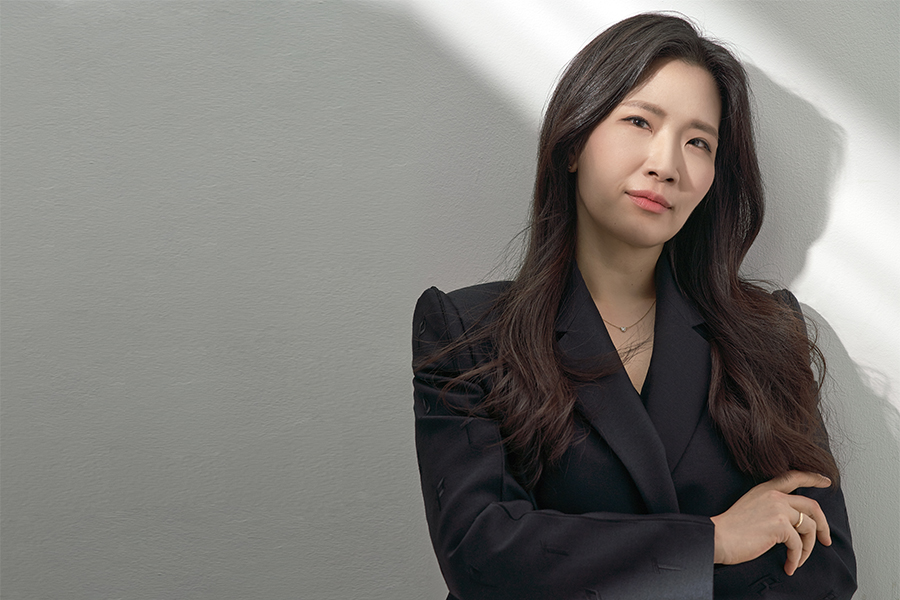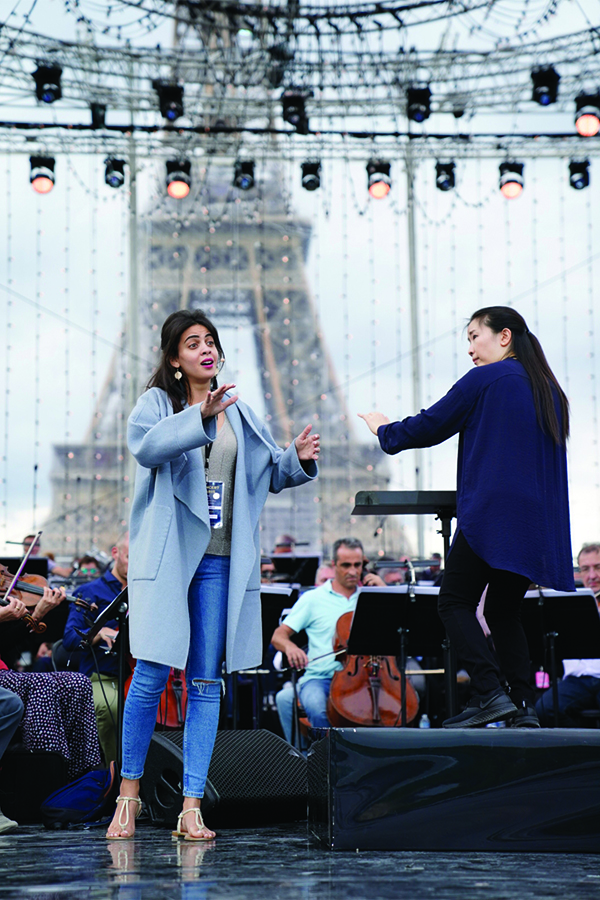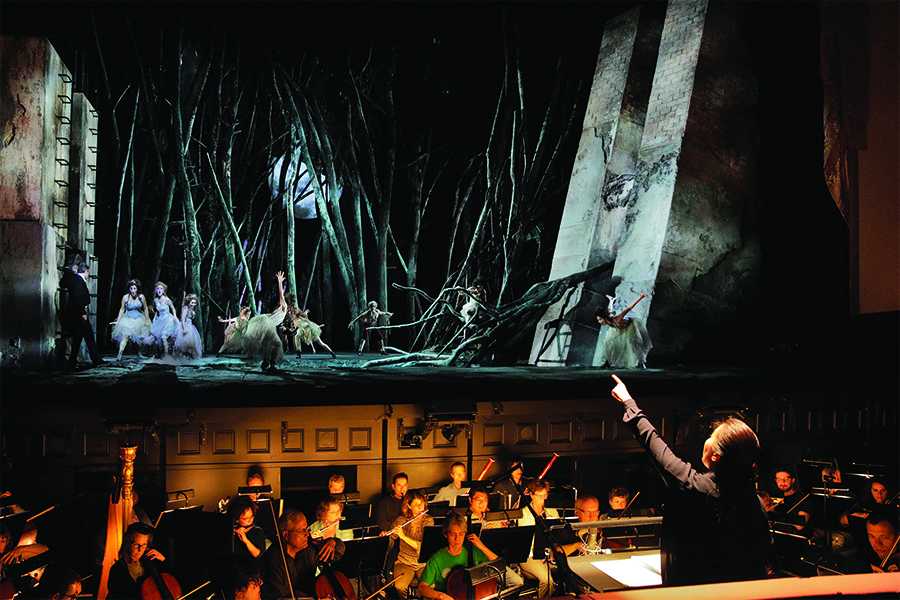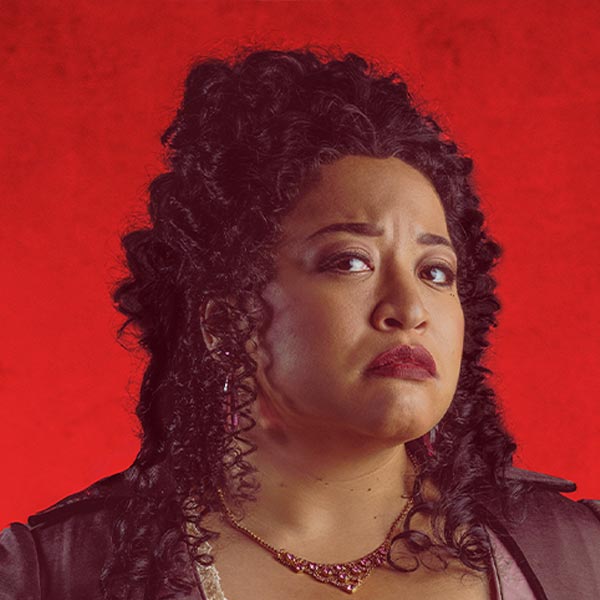February 04, 2022
Making magic on the podium
A talk with conductor Eun Sun Kim
Among the numerous pleasures delayed by the pandemic was the Lyric Opera debut of Maestro Eun Sun Kim. But in the meantime, the Korean conductor's blazing star has only continued to rise. This past August, she began her tenure as San Francisco Opera's first female music director. In the Fall, her Metropolitan Opera debut, with La bohème, received rave reviews.
In other words, Kim isn't one to let obstacles stand in her way for long. Even the outmoded but persistent barriers that once stood in the way of women leading opera companies or symphony orchestras garner very little notice from Kim. When she's on the podium, what matters to her is doing full justice to the music.
Still — even with all the triumphs and the consistently ecstatic praise from critics — has she ever experienced a moment when being a woman was a professional issue for her? "Maybe there was," Kim says, speaking via Zoom from Seoul, her hometown. "But if something happens because I'm a woman, or Asian, or young, I don't analyze the situation. In rehearsal, I don't have time to consider that kind of thing — I think that's just my character. I know that some of my female colleagues have had problems. Simone Young (Australian conductor, former Hamburg State Opera artistic director) was an icebreaker, and I really appreciate that she was there first. My generation has had a slightly easier time."
Kim studied composition in Korea, "but I always worked with singers and instrumentalists, accompanying them at the piano. I also always attended voice lessons, so I knew what singing was about — the voice attracted me as an instrument. Every second year our university did an opera production, so I became a rehearsal pianist." She began her conducting in Seoul, and after relocating to Stuttgart, Germany, she earned a doctorate there in orchestra conducting. She came up the traditional way for conductors in Europe, playing for rehearsals and coaching singers in an opera house — in her case Madrid's Teatro Real. With her 2012 debut in Frankfurt, she was off and running, quickly accumulating credits in major European opera companies. She has triumphed at London's English National Opera, the Royal Swedish Opera in Stockholm, and all the leading German companies (Berlin, Stuttgart, Dresden, Frankfurt, Cologne), as well as in the United States.

Is there a desert-island performance of hers that left her totally satisfied? "I'm never satisfied! Artistically I have my ideal, but it's always difficult to find a balance between that ideal performance or sound and what it actually is." Inevitably, though, particular performances do stand out, including that Frankfurt debut: "It all happened very fast! They changed the performance from a concert to La bohème and were looking for a conductor. I didn't know the orchestra, and there was no rehearsal with them. In Germany, for La traviata or La bohème, you don't get rehearsal — you just go into the pit in the evening." Applause for her from the orchestra made her realize that she'd truly gotten the job done.
Kim has strong memories of her North American debut with Traviata at Houston Grand Opera (2017, after HGO's theater suffered damage from Hurricane Harvey). "They reached out in late July to say they were looking for a venue — it was going to be the convention center." The company offered to switch the productions and make Kim's debut later, once the theater was repaired, "but I just said 'the venue doesn't matter — I will come!'"
Kim is now principal guest conductor at HGO. And her appointment at San Francisco Opera is nothing less than history-making. Rusalka, her debut there in 2019, was glorious, and she remains grateful for it: "In terms of the ensemble with all the artists, the orchestra, the stage managers — that level of teamwork was something I was really experiencing for the first time." She had never visited San Francisco before Rusalka: "I felt it was similar to a European atmosphere — maybe that was a reason I felt really comfortable there."

2020 Concert de Paris rehearsal with Egyptian soprano Fatma Said
With her insatiable musical curiosity, Kim is always learning new music, although she doesn't have favorites ("I fall in love with any piece when I'm conducting it"). The major German houses all do a large number of works each season, and this clearly created the foundation of Kim's own wide-ranging repertoire. "They present way more performances there than in American houses," she says. "Practically every evening!" In any run of performances, she notes, "the orchestra musicians change — there is rotation. So, in an orchestra reading, you don't get to see all the musicians you're going to perform with. In America you have one team, which is a big advantage — like in a symphony concert. You can develop the same language." On the other hand, what Kim especially enjoys in the German system is "when you see a musician for the first time in performance. That can be a magical moment: you don't know the person, but then in the performance we feel the same thing, we do the same thing at that moment. That can only happen through the language of music."
After she conducts an opera production, Kim always comes back to concerts. That balance is important to her. "There's no stage action to think about in concerts, but in terms of music-making, I always feel the same thing: I sometimes say to the orchestra musicians, 'Please sing more!' and I tell the singers, 'Be instrumental!' because I always consider the voice as an instrument. When the principals and chorus are onstage, I see it all like a big orchestra, with the voices as part of a big ensemble."
Like every artist, Kim has had to deal with cancellations since the start of COVID but she says, "I live today, I really do. I'm studying scores. I'm also studying languages, which are necessary for my job." She's working on her French and Italian right now, just to maintain those skills, and wants "to learn Russian, in order to conduct that repertoire. I just don't dare conduct Russian works without being able to speak the language." The past year's cancellations have enabled her to be flexible. "I lost my Vienna Staatsoper debut, but then the concert at La Scala came up, so I was able to go to Milan for that — six different pieces and three different programs. My first time with the Scala orchestra. It was great!"

Eun Sun Kim conducts Rusalka rehearsal at San Francisco Opera.
Photo credit: Nikolaj Lund, Kim Tae-hwan, Christophe Abramowitz, Cory Weaver/San Francisco Opera
March 12 – April 10, 2022
Tosca
Tosca
A diva who has all of Rome at her feet. A woman who takes charge of her life and fights for what she wants. A heroine who is brave and loving, extravagantly emotional, yet utterly irresistible. Floria Tosca is all these things. She’s loved by Mario Cavaradossi, the revolutionary, and lusted after by Baron Scarpia, Rome’s vicious police chief. Puccini’s lushly grand-scale music illuminates these characters, and the entire opera bursts with a theatricality that makes Tosca a favorite of audiences everywhere.

